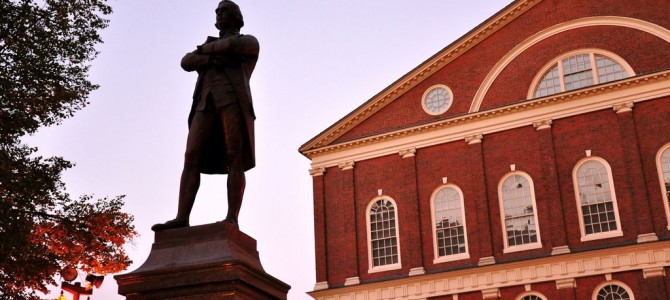
In the tenth lecture of Hillsdale College’s free online Constitution 101 course (which you can take along with me here) Larry Arnn asks: “What would a statesman do to restore the Constitution?”
To ensure citizens continue to uphold the principles behind the Declaration of Independence and the Constitution, they must cultivate habits — or mores, if you will — that promote liberty, Arnn says. Temperance, frugality, and courage are moral virtues that individuals must possess to be free. If a person is afraid or cannot exercise self-restraint, then he is a slave to those passions.
A Greater Reverence For God
Throughout the Declaration of Independence are appeals to God — acknowledgements of his power, respectful references to him, and appeals for his favor. Americans ought to understand their duties and obligations to God and one another in order to understand freedom and live a fulfilling life.
Soon after the Continental Congress was established, they declared a fast day and urged all Americans to forego food, pray, and ask God for his help and divine mercy.
“It becomes all public bodies, as well as private persons, to reverence the Providence of God, and look up to him as the supreme disposer of all events, and the arbiter of the fate of nations,” the declaration states.
In this short and simple phrase, it’s evident the Founders intended that Americans revere and honor God, as he decides the fate of all nations and peoples. In his farewell address, President George Washington urged Americans to live moral and religious lives, as those two things are necessary for happiness.
Of all the dispositions and habits which lead to political prosperity, Religion and morality are indispensable supports. In vain would that man claim the tribute of Patriotism, who should labor to subvert these great Pillars of human happiness, these firmest props of the duties of Men and citizens.
Compelling citizens to worship a certain way or to live a religious life is contrary to the concept of virtue, as serving God and worshiping him requires free will. Thus Thomas Jefferson said that Americans should not be forced to express an opinion or participate in something that violates their conscience. In a letter to the Baptist Association of Danbury Connecticut, Jefferson makes it clear the government should not establish a national religion nor oblige citizens to participate in it. He understood that the role of government must remain small so as not to infringe upon people’s religious convictions.
Our sentiments are uniformly on the side of religious liberty–that religion is at all times and places a matter between God and individuals–that no man ought to suffer in name, person, or effects on account of his religious opinions–that the legitimate power of civil government extends no further than to punish the man who works ill to his neighbors…
Government Ought To Look Different Than It Does Today
Arnn speculates that if the federal government stuck to the powers given it throughout the founding documents, a large portion of the federal government would be dedicated to defense, as much of the ink spelling out the responsibilities of the federal government pertain to the military. The federal government would be much less involved in overseeing our everyday lives, as much of the regulations to rule everyday life, aside from commerce between states, was left to state and local governments to decide for much of American history. Entitlement programs — Social Security, Medicare, and Medicaid — ought to be changed to give citizens more control of their destinies.
Americans ought to question centralization. Is it good that the federal government has so much power and controls so much? Government should allow men to live independently and support themselves, for this is an integral part of living a virtuous life. Large government programs that discourage independence are antithetical to the mores that make Americans themselves.
Government as it exists today is guided by a progressive understanding of human nature. Progressives, who reject natural law theory and think governing ought to be driven by expediency, have expanded the role of government to a degree that it now encroaches on citizens’ ability to create virtuous lives.









